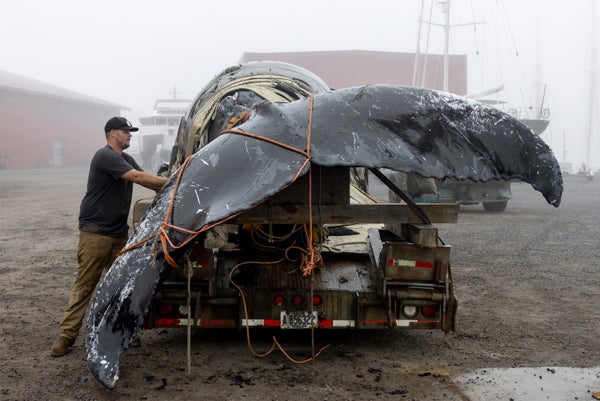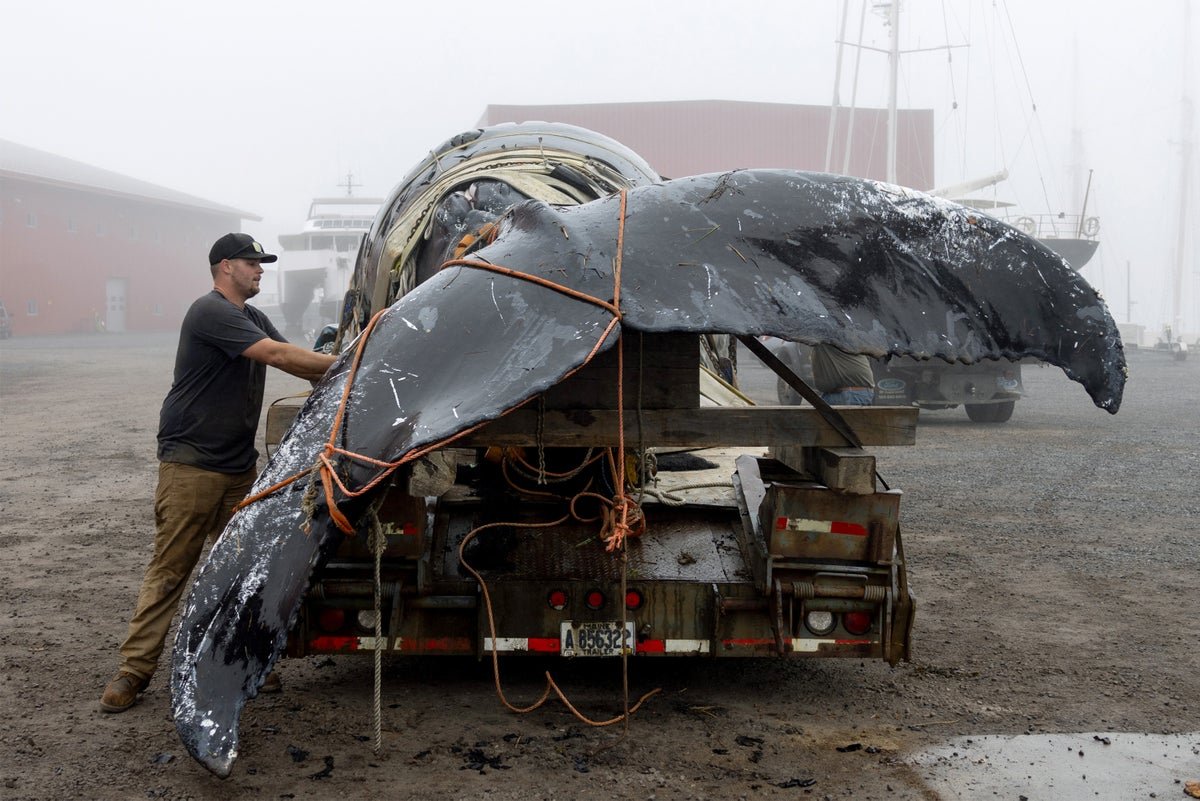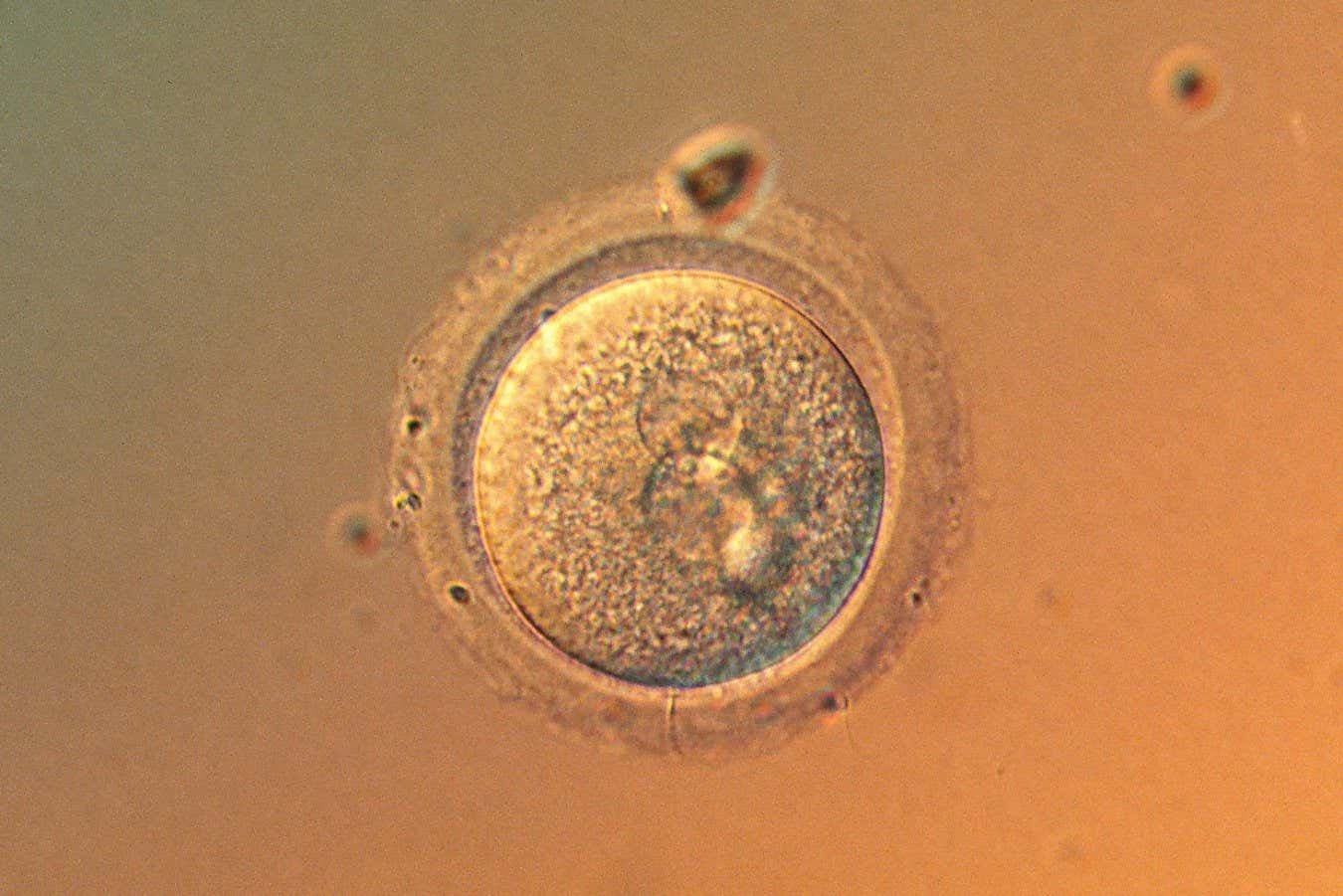The Law That Saved the Whales Is Under Attack
Proposed amendments to the Marine Mammal Protection Act would cut down protections to whales, dolphins, polar bears and other species

Aaron Doughty finishes securing a dead humpback whale that was hauled out of Portland Harbor on to his trailer on Thursday, June 6, 2024.
Brianna Soukup/Portland Press Herald via Getty Images
A landmark law passed more than 50 years ago to protect whales, dolphins and other marine mammals in U.S. waters could be upended by amendments proposed on July 22 during a legislative hearing of the House Committee on Natural Resources’ Subcommittee on Water, Wildlife, and Fisheries.
Republican representative Nicholas Begich of Alaska proposed changes to the Marine Mammal Protection Act (MMPA) that some scientists say would eviscerate it. For instance, the amendments would roll back current definitions of harm or disturbance to marine mammals while also requiring “impossibly high hurdles for conservation action,” according to a fact sheet from the Natural Resources Defense Council and other organizations that was issued earlier in July. These hurdles include a much higher burden of proof to justify even simple conservation actions.
The Marine Mammal Protection Act was passed in 1972 with bipartisan support and was implemented following 150 years of industrial whaling, where some whale populations had fallen to 5 percent or less of their historical estimates.
On supporting science journalism
If you’re enjoying this article, consider supporting our award-winning journalism by subscribing. By purchasing a subscription you are helping to ensure the future of impactful stories about the discoveries and ideas shaping our world today.
Since its passing, not a single marine mammal species in U.S. waters has gone extinct, even as use of the ocean has increased. The act has overseen astonishing recoveries of species such as humpback whales—according to a 2006 study, North Pacific humpback whale abundance was estimated at 21,063 individuals, recovered from what the National Oceanic and Atmospheric Administration estimates could have been only a few thousand individuals in the 1970s.
“Some of the most compelling conservation success stories in recent history” have the MMPA to thank, says Lauren Eckert, a postdoctoral fellow researching conservation science at the University of British Columbia.
Some marine mammals have yet to fully recover, and in these cases, the act plays a crucial role as the last line of defense against extinction. Take the North Atlantic right whale; if even one of these critically endangered animals is lost, “that could be the difference between them being here 100 years from now and them being gone,” says John Hildebrand, a professor at the Scripps Institution of Oceanography, who studies sound used by marine mammals. “Without the MMPA, these groups would have very little chance of going forward,” he says. “With the MMPA, they’ve got a fighting chance.” These mammals are vital to not only ocean ecosystems but also economies; according to a 2020 study from NOAA, Alaska’s whale watching industry brings in more than $100 million annually.
The amendments hamstring scientific processes that have proven successful for decades, experts say. They would require scientists to obtain “systematic and complete abundance survey data,” or exact accountings of animal numbers, to establish any limit on marine mammal loss. “It is disturbing because systematic, long-term surveys of these populations are already extremely difficult and are going to become more so,” Eckert says.
Further, the draft downgrades requirements to sustain healthy populations of marine mammals to a “minimum survivability of populations.” Instead of necessitating sustainable, genetically diverse populations, it would require a much lower bar for the number of individuals in the wild.
Scientists contacted by Scientific American are also concerned about the proposed changes to how protections are granted; under these amendments, the U.S. would only recognize protections for marine mammals where there has been a direct effect rather than including the indirect effects that are currently in the MMPA. “The deaths of marine mammals that aren’t directly observed and documented are excluded from any takes [animal capture allowances] or regulatory action,” Eckert says. Although military sonar or offshore drilling can have profound consequences for marine mammals, it would become near impossible to regulate these activities in the name of protecting animals, she adds.
The amendments would also undermine the process known as “take reduction planning,” which protects marine mammals that are accidentally caught or entangled in fishing gear, called “incidental take,” by eliminating a key safeguard that limits marine mammal deaths. This is especially dangerous for the critically endangered North Atlantic right whale, for which entanglements are a primary threat.
The draft amendments contradict Republican rhetoric about protecting ocean life. President Donald Trump and other Republicans have actively blocked offshore wind projects that follow environmental regulations, claiming they endanger whales (ship strikes and net entanglements are greater dangers). Additionally, this draft is taking shape in tandem with another extreme proposal that would repeal much of the Endangered Species Act, which has historically worked harmoniously with the MMPA.
In the coming months, the stakeholders pushing this draft could decide to drop it, resolve certain aspects or move it forward as is. If the bill is passed, it would move through the standard legislative process, possibly even making it to the Senate floor for a vote.
Regardless of what happens, “this is an extreme bill. This is essentially a rewrite of the entire Marine Mammal Protection Act,” says Jane Davenport, an attorney at the conservation organization Defenders of Wildlife, one of the groups that issued the July fact sheet. “The overall thrust is going to essentially put a stake through the heart of the statute.”
Many of the animals that would lose protection from changes to the MMPA are already vulnerable to climate change, says Jeff Boehm, former executive director of the Marine Mammal Center. “They’re an embodiment of so much about the oceans,” he says, “and a more serious assault on how this nation manages and conserves marine mammals, I can’t imagine.”
It’s Time to Stand Up for Science
Before you close the page, we need to ask for your support. Scientific American has served as an advocate for science and industry for 180 years, and we think right now is the most critical moment in that two-century history.
We’re not asking for charity. If you become a Digital, Print or Unlimited subscriber to Scientific American, you can help ensure that our coverage is centered on meaningful research and discovery; that we have the resources to report on the decisions that threaten labs across the U.S.; and that we support both future and working scientists at a time when the value of science itself often goes unrecognized. Click here to subscribe.




